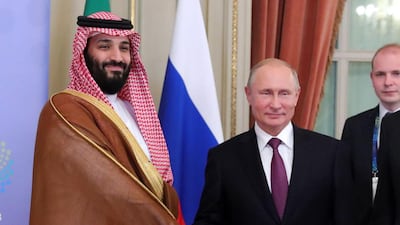Opec and its allies led by Russia are set to convene in Vienna on Thursday amid a cloud of uncertainty over a decision to trim production and the future of the organisation.
The exporters’ group and its allies, known as Opec+, see themselves at the same juncture they did in 2016. However, this time there is less certainty of a consensus to cut amid the exit of Qatar on January 1. Qatar was on board in 2016 when Opec
agreed to reduce inventories by slashing 1.2 million barrels per day out of its production. On top of that, allies cut 600,000 bpd.
"Our baseline scenario is that Opec+ is likely to favour supporting prices over market share and collectively act by cutting production between 1 to 1.4 million bpd to curb the current oversupply in the market,” said Ehsan Khoman, Mena research head at Japan’s MUFG Bank said.
______________
LISTEN: Business Extra Podcast
______________
Opec, led by Saudi Arabia, and the producers outside of the group headed by Russia were widely expected to institutionalise their two-year co-operation at this meeting.
But a decision to trim output seems less definitive than last month when Saudi energy minister Khalid Al Falih said the alliance could trim up to 1 million bpd next year if needed.
In an interview with Bloomberg on Tuesday, Mr Al Falih said Moscow backs output curbs “in principle,” but it’s “premature” to say what they will agree in Vienna this week.
Opec+ had earlier in May reversed the production cuts that have been in place since January last year to steady prices, which had rallied around three-year highs of $75 per barrel for Brent for much of the summer, eventually peaking at $86 in October. However, Brent soon crashed, losing 30 per cent of its value in a month as record-high US production and limited impact of US sanctions against Iran began to materialise.
Opec+ is also grappling with pressure from the US administration under President Donald Trump, who wants to see prices go even lower, tweeting last month that he saw the slip in prices as a “tax cut” for “America and the world”.
MUFG anticipates the alliance to display “constructive ambiguity” through a “carefully drafted, worded declaration of characteristic Opec diplomacy” to manage external pressures, notably from President Trump.
___________
Read more:
Quick take: Why is Opec important?
Quicktake: why is Qatar leaving Opec?
___________
"As such, this likely thinly veiled message will quietly inform markets that Opec+ will cut to raise oil prices on the front end, without explicitly drawing attention to risk President Trump’s wrath,” said Mr Khoman.
The upcoming meeting however would certainly test the current bond between Saudi Arabia and Russia, possibly revealing a divergence of interest. Moscow is seemingly aligned with the US, in its aspiration for a lower Brent than Saudi Arabia’s preferred range of $75 per barrel, he added. Russian producers would much prefer Brent trending around $60 to $65 per barrel. However, many see Russia’s alliance and the meeting between Saudi Crown Prince Mohammed bin Salman and President Vladimir Putin at the G20 meeting as an indication that the two may come to an agreement after all.
Another cloud over the Vienna event would be Qatar’s exit after 57 years of Opec membership, a move that Olivier Jakob of Petromatrix said could allow small producing states to question the benefits of remaining within the group.
“The decision making is now concentrated in the hands of Saudi Arabia and Russia,” said Mr Jakob.
"We think that it will be important to closely follow the developments in the US of the 'No Oil Producing and Exporting Cartels Act' (NOPEC). If momentum grows in the US for such legislation, then the smaller Opec countries might decide that the risks and costs of staying formally in Opec outweigh the benefits,” he added.
The NOPEC congressional bill asks for state immunity to be removed and for Opec to be sued under US antitrust law for anti-competitive attempts at what is being perceived by some legislators to be the group’s manipulation of supply and prices.


